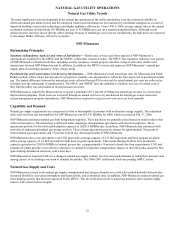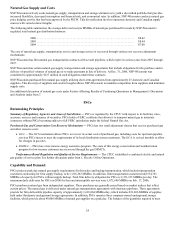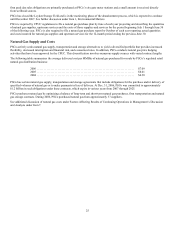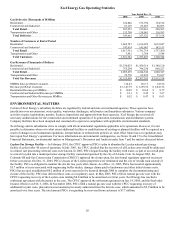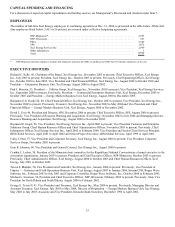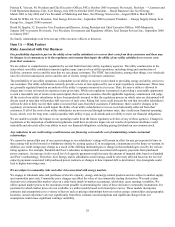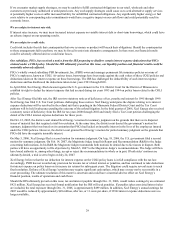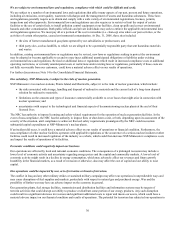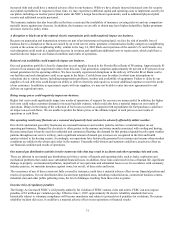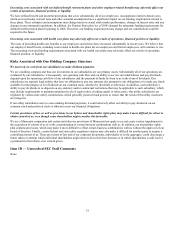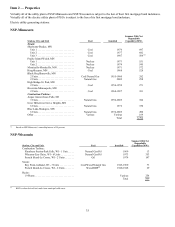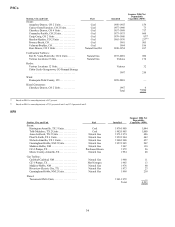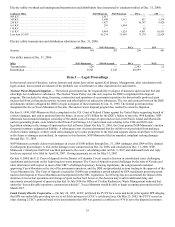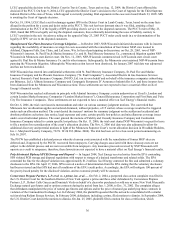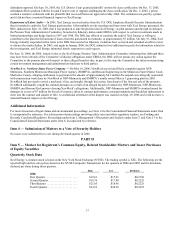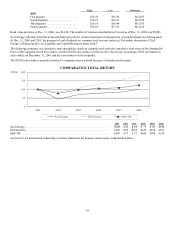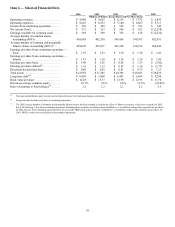Xcel Energy 2006 Annual Report Download - page 40
Download and view the complete annual report
Please find page 40 of the 2006 Xcel Energy annual report below. You can navigate through the pages in the report by either clicking on the pages listed below, or by using the keyword search tool below to find specific information within the annual report.30
We are subject to environmental laws and regulations, compliance with which could be difficult and costly.
We are subject to a number of environmental laws and regulations that affect many aspects of our past, present and future operations,
including air emissions, water quality, wastewater discharges and the management of wastes and hazardous substances. These laws
and regulations generally require us to obtain and comply with a wide variety of environmental registrations, licenses, permits,
inspections and other approvals. Environmental laws and regulations can also require us to restrict or limit the output of certain
facilities or the use of certain fuels, to install pollution control equipment at our facilities, clean up spills and correct environmental
hazards and other contamination. Both public officials and private individuals may seek to enforce the applicable environmental laws
and regulations against us. We must pay all or a portion of the cost to remediate (i.e. clean-up) sites where our past activities, or the
activities of certain other parties, caused environmental contamination. At Dec. 31, 2006, these sites included:
• the sites of former manufactured gas plants operated by our subsidiaries or predecessors; and
• third party sites, such as landfills, to which we are alleged to be a potentially responsible party that sent hazardous materials
and wastes.
In addition, existing environmental laws or regulations may be revised, new laws or regulations seeking to protect the environment
may be adopted or become applicable to us and we may incur additional unanticipated obligations or liabilities under existing
environmental laws and regulations. Revised or additional laws or regulations which result in increased compliance costs or additional
operating restrictions, or currently unanticipated costs or restrictions under existing laws or regulations, particularly if those costs are
not fully recoverable from our customers, could have a material adverse effect on our results of operations.
For further discussion see Note 14 to the Consolidated Financial Statements.
Our subsidiary, NSP-Minnesota, is subject to the risks of nuclear generation.
NSP-Minnesota’s two nuclear stations, Prairie Island and Monticello, subject it to the risks of nuclear generation, which include:
• the risks associated with storage, handling and disposal of radioactive materials and the current lack of a long-term disposal
solution for radioactive materials;
• limitations on the amounts and types of insurance commercially available to cover losses that might arise in connection with
nuclear operations; and
• uncertainties with respect to the technological and financial aspects of decommissioning nuclear plants at the end of their
licensed lives.
The NRC has authority to impose licensing and safety-related requirements for the operation of nuclear generation facilities. In the
event of non-compliance, the NRC has the authority to impose fines or shut down a unit, or both, depending upon its assessment of the
severity of the situation, until compliance is achieved. Revised safety requirements promulgated by the NRC could necessitate
substantial capital expenditures at NSP-Minnesota’s nuclear plants.
If an incident did occur, it could have a material adverse effect on our results of operations or financial condition. Furthermore, the
non-compliance of other nuclear facilities operators with applicable regulations or the occurrence of a serious nuclear incident at other
facilities could result in increased regulation of the industry as a whole, which could then increase NSP-Minnesota’s compliance costs
and impact the results of operations of its facilities.
Economic conditions could negatively impact our business.
Our operations are affected by local and national economic conditions. The consequences of a prolonged recession may include a
lower level of economic activity and uncertainty regarding energy prices and the capital and commodity markets. A lower level of
economic activity might result in a decline in energy consumption, which may adversely affect our revenues and future growth.
Instability in the financial markets, as a result of recession or otherwise, also may affect the cost of capital and our ability to raise
capital.
Our operations could be impacted by war, acts of terrorism or threats of terrorism.
The conflict in Iraq and any other military strikes or sustained military campaign may affect our operations in unpredictable ways and
may cause disruptions of fuel supplies and markets, particularly with respect to natural gas and purchased energy. War and the
possibility of further war may have an adverse impact on the economy in general.
Our generation plants, fuel storage facilities, transmission and distribution facilities and information systems may be targets of
terrorist activities that could disrupt our ability to produce or distribute some portion of our energy products. Any such disruption
could result in a significant decrease in revenues and significant additional costs to repair and insure our assets, which could have a
material adverse impact on our financial condition and results of operations. The potential for terrorism has subjected our operations to




